Analyzing the Entrepreneurship Process of Mark Zuckerberg and Facebook
VerifiedAdded on 2019/10/16
|7
|1399
|169
Report
AI Summary
This report provides a detailed analysis of Mark Zuckerberg's entrepreneurship process in developing Facebook. It begins with an introduction defining the entrepreneurship process and highlighting Zuckerberg's role as the founder of Facebook, a prominent social media platform. The report then delves into Zuckerberg's background, opportunity identification, the method he used to protect his business idea, and the legal structure he selected for Facebook. It further explores the strategies he employed to attract the target market, his transition from an entrepreneur to a manager, and the exit strategies used to harvest the business. The report also addresses the challenges Zuckerberg faced, the strategies he used to avoid these challenges, and lessons learned from his entrepreneurial journey. Finally, the report provides recommendations for aspiring entrepreneurs and concludes by emphasizing Zuckerberg's effective combination of business and personal development strategies, ensuring Facebook's long-term success in the market. The analysis is supported by references to relevant sources.

Running Head: Entrepreneurship Process
Entrerpreneurship Process
Entrerpreneurship Process
Paraphrase This Document
Need a fresh take? Get an instant paraphrase of this document with our AI Paraphraser
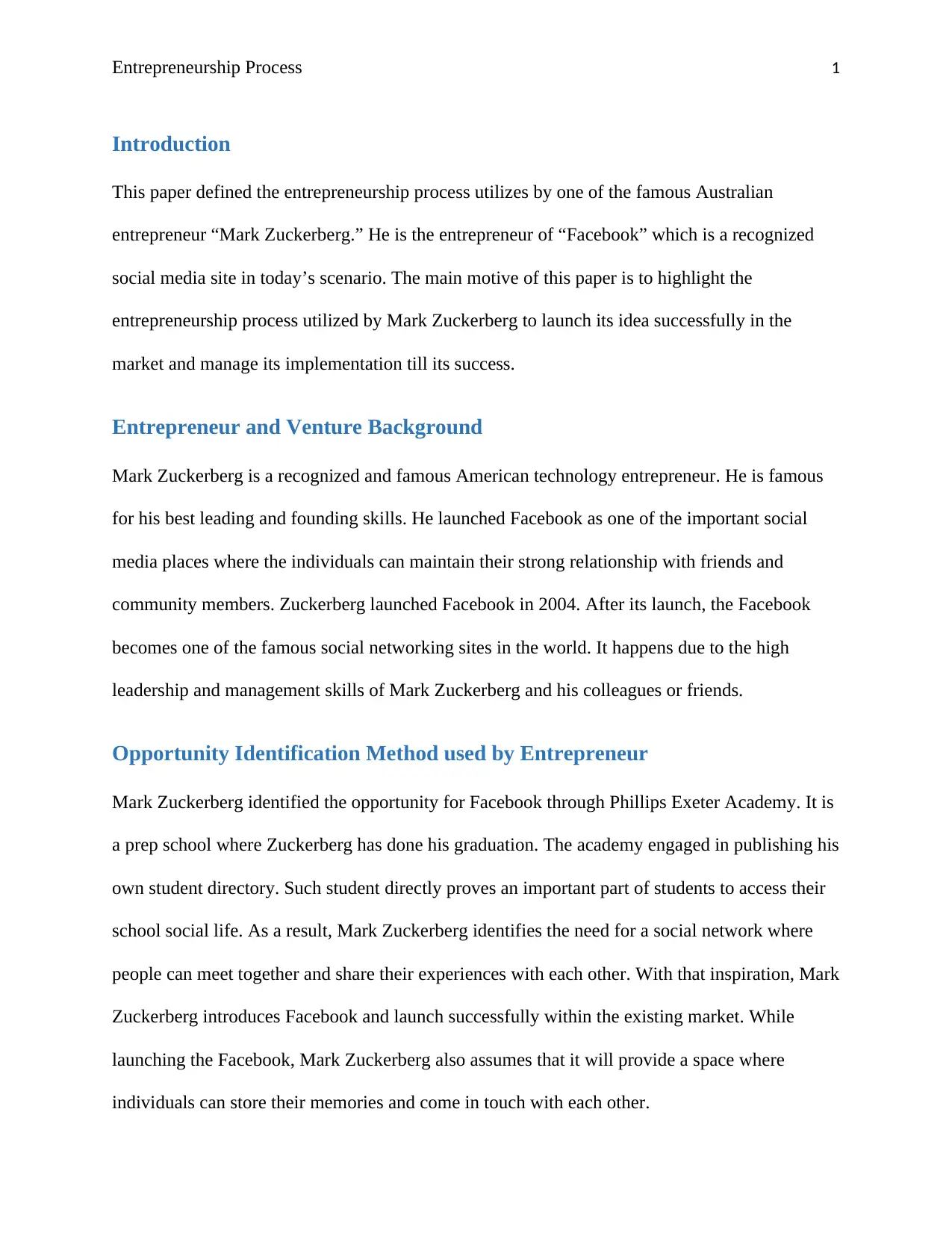
Entrepreneurship Process 1
Introduction
This paper defined the entrepreneurship process utilizes by one of the famous Australian
entrepreneur “Mark Zuckerberg.” He is the entrepreneur of “Facebook” which is a recognized
social media site in today’s scenario. The main motive of this paper is to highlight the
entrepreneurship process utilized by Mark Zuckerberg to launch its idea successfully in the
market and manage its implementation till its success.
Entrepreneur and Venture Background
Mark Zuckerberg is a recognized and famous American technology entrepreneur. He is famous
for his best leading and founding skills. He launched Facebook as one of the important social
media places where the individuals can maintain their strong relationship with friends and
community members. Zuckerberg launched Facebook in 2004. After its launch, the Facebook
becomes one of the famous social networking sites in the world. It happens due to the high
leadership and management skills of Mark Zuckerberg and his colleagues or friends.
Opportunity Identification Method used by Entrepreneur
Mark Zuckerberg identified the opportunity for Facebook through Phillips Exeter Academy. It is
a prep school where Zuckerberg has done his graduation. The academy engaged in publishing his
own student directory. Such student directly proves an important part of students to access their
school social life. As a result, Mark Zuckerberg identifies the need for a social network where
people can meet together and share their experiences with each other. With that inspiration, Mark
Zuckerberg introduces Facebook and launch successfully within the existing market. While
launching the Facebook, Mark Zuckerberg also assumes that it will provide a space where
individuals can store their memories and come in touch with each other.
Introduction
This paper defined the entrepreneurship process utilizes by one of the famous Australian
entrepreneur “Mark Zuckerberg.” He is the entrepreneur of “Facebook” which is a recognized
social media site in today’s scenario. The main motive of this paper is to highlight the
entrepreneurship process utilized by Mark Zuckerberg to launch its idea successfully in the
market and manage its implementation till its success.
Entrepreneur and Venture Background
Mark Zuckerberg is a recognized and famous American technology entrepreneur. He is famous
for his best leading and founding skills. He launched Facebook as one of the important social
media places where the individuals can maintain their strong relationship with friends and
community members. Zuckerberg launched Facebook in 2004. After its launch, the Facebook
becomes one of the famous social networking sites in the world. It happens due to the high
leadership and management skills of Mark Zuckerberg and his colleagues or friends.
Opportunity Identification Method used by Entrepreneur
Mark Zuckerberg identified the opportunity for Facebook through Phillips Exeter Academy. It is
a prep school where Zuckerberg has done his graduation. The academy engaged in publishing his
own student directory. Such student directly proves an important part of students to access their
school social life. As a result, Mark Zuckerberg identifies the need for a social network where
people can meet together and share their experiences with each other. With that inspiration, Mark
Zuckerberg introduces Facebook and launch successfully within the existing market. While
launching the Facebook, Mark Zuckerberg also assumes that it will provide a space where
individuals can store their memories and come in touch with each other.
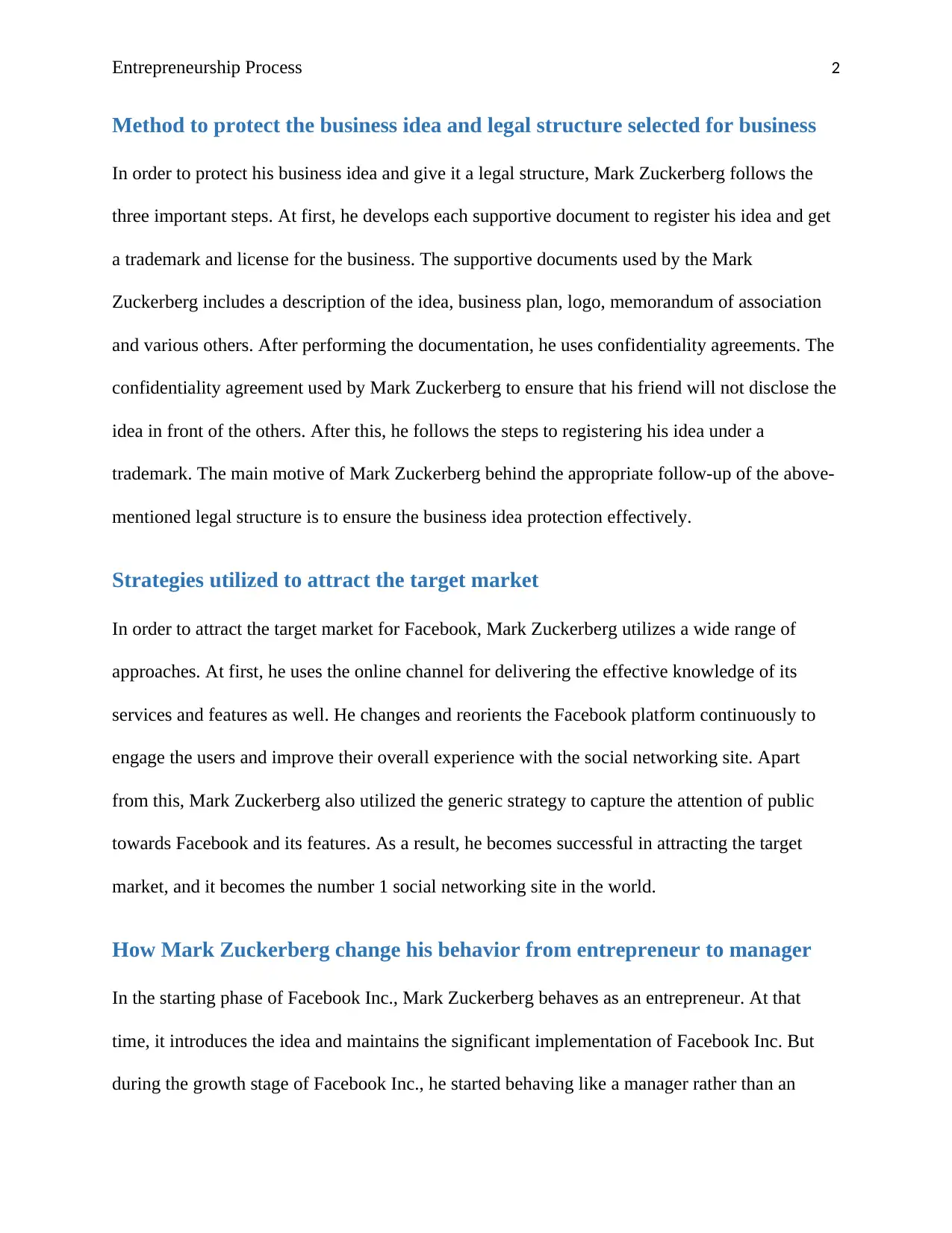
Entrepreneurship Process 2
Method to protect the business idea and legal structure selected for business
In order to protect his business idea and give it a legal structure, Mark Zuckerberg follows the
three important steps. At first, he develops each supportive document to register his idea and get
a trademark and license for the business. The supportive documents used by the Mark
Zuckerberg includes a description of the idea, business plan, logo, memorandum of association
and various others. After performing the documentation, he uses confidentiality agreements. The
confidentiality agreement used by Mark Zuckerberg to ensure that his friend will not disclose the
idea in front of the others. After this, he follows the steps to registering his idea under a
trademark. The main motive of Mark Zuckerberg behind the appropriate follow-up of the above-
mentioned legal structure is to ensure the business idea protection effectively.
Strategies utilized to attract the target market
In order to attract the target market for Facebook, Mark Zuckerberg utilizes a wide range of
approaches. At first, he uses the online channel for delivering the effective knowledge of its
services and features as well. He changes and reorients the Facebook platform continuously to
engage the users and improve their overall experience with the social networking site. Apart
from this, Mark Zuckerberg also utilized the generic strategy to capture the attention of public
towards Facebook and its features. As a result, he becomes successful in attracting the target
market, and it becomes the number 1 social networking site in the world.
How Mark Zuckerberg change his behavior from entrepreneur to manager
In the starting phase of Facebook Inc., Mark Zuckerberg behaves as an entrepreneur. At that
time, it introduces the idea and maintains the significant implementation of Facebook Inc. But
during the growth stage of Facebook Inc., he started behaving like a manager rather than an
Method to protect the business idea and legal structure selected for business
In order to protect his business idea and give it a legal structure, Mark Zuckerberg follows the
three important steps. At first, he develops each supportive document to register his idea and get
a trademark and license for the business. The supportive documents used by the Mark
Zuckerberg includes a description of the idea, business plan, logo, memorandum of association
and various others. After performing the documentation, he uses confidentiality agreements. The
confidentiality agreement used by Mark Zuckerberg to ensure that his friend will not disclose the
idea in front of the others. After this, he follows the steps to registering his idea under a
trademark. The main motive of Mark Zuckerberg behind the appropriate follow-up of the above-
mentioned legal structure is to ensure the business idea protection effectively.
Strategies utilized to attract the target market
In order to attract the target market for Facebook, Mark Zuckerberg utilizes a wide range of
approaches. At first, he uses the online channel for delivering the effective knowledge of its
services and features as well. He changes and reorients the Facebook platform continuously to
engage the users and improve their overall experience with the social networking site. Apart
from this, Mark Zuckerberg also utilized the generic strategy to capture the attention of public
towards Facebook and its features. As a result, he becomes successful in attracting the target
market, and it becomes the number 1 social networking site in the world.
How Mark Zuckerberg change his behavior from entrepreneur to manager
In the starting phase of Facebook Inc., Mark Zuckerberg behaves as an entrepreneur. At that
time, it introduces the idea and maintains the significant implementation of Facebook Inc. But
during the growth stage of Facebook Inc., he started behaving like a manager rather than an
⊘ This is a preview!⊘
Do you want full access?
Subscribe today to unlock all pages.

Trusted by 1+ million students worldwide
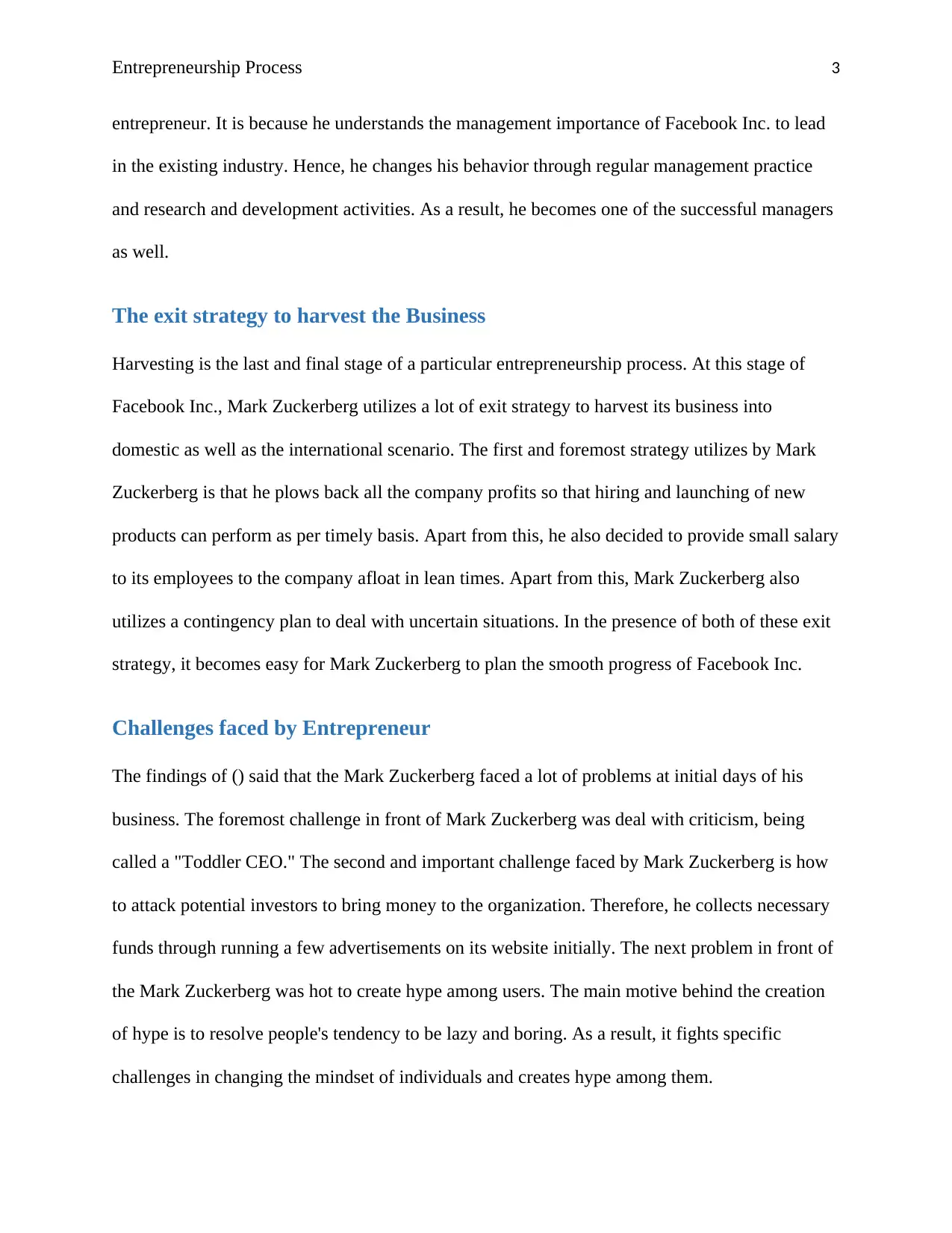
Entrepreneurship Process 3
entrepreneur. It is because he understands the management importance of Facebook Inc. to lead
in the existing industry. Hence, he changes his behavior through regular management practice
and research and development activities. As a result, he becomes one of the successful managers
as well.
The exit strategy to harvest the Business
Harvesting is the last and final stage of a particular entrepreneurship process. At this stage of
Facebook Inc., Mark Zuckerberg utilizes a lot of exit strategy to harvest its business into
domestic as well as the international scenario. The first and foremost strategy utilizes by Mark
Zuckerberg is that he plows back all the company profits so that hiring and launching of new
products can perform as per timely basis. Apart from this, he also decided to provide small salary
to its employees to the company afloat in lean times. Apart from this, Mark Zuckerberg also
utilizes a contingency plan to deal with uncertain situations. In the presence of both of these exit
strategy, it becomes easy for Mark Zuckerberg to plan the smooth progress of Facebook Inc.
Challenges faced by Entrepreneur
The findings of () said that the Mark Zuckerberg faced a lot of problems at initial days of his
business. The foremost challenge in front of Mark Zuckerberg was deal with criticism, being
called a "Toddler CEO." The second and important challenge faced by Mark Zuckerberg is how
to attack potential investors to bring money to the organization. Therefore, he collects necessary
funds through running a few advertisements on its website initially. The next problem in front of
the Mark Zuckerberg was hot to create hype among users. The main motive behind the creation
of hype is to resolve people's tendency to be lazy and boring. As a result, it fights specific
challenges in changing the mindset of individuals and creates hype among them.
entrepreneur. It is because he understands the management importance of Facebook Inc. to lead
in the existing industry. Hence, he changes his behavior through regular management practice
and research and development activities. As a result, he becomes one of the successful managers
as well.
The exit strategy to harvest the Business
Harvesting is the last and final stage of a particular entrepreneurship process. At this stage of
Facebook Inc., Mark Zuckerberg utilizes a lot of exit strategy to harvest its business into
domestic as well as the international scenario. The first and foremost strategy utilizes by Mark
Zuckerberg is that he plows back all the company profits so that hiring and launching of new
products can perform as per timely basis. Apart from this, he also decided to provide small salary
to its employees to the company afloat in lean times. Apart from this, Mark Zuckerberg also
utilizes a contingency plan to deal with uncertain situations. In the presence of both of these exit
strategy, it becomes easy for Mark Zuckerberg to plan the smooth progress of Facebook Inc.
Challenges faced by Entrepreneur
The findings of () said that the Mark Zuckerberg faced a lot of problems at initial days of his
business. The foremost challenge in front of Mark Zuckerberg was deal with criticism, being
called a "Toddler CEO." The second and important challenge faced by Mark Zuckerberg is how
to attack potential investors to bring money to the organization. Therefore, he collects necessary
funds through running a few advertisements on its website initially. The next problem in front of
the Mark Zuckerberg was hot to create hype among users. The main motive behind the creation
of hype is to resolve people's tendency to be lazy and boring. As a result, it fights specific
challenges in changing the mindset of individuals and creates hype among them.
Paraphrase This Document
Need a fresh take? Get an instant paraphrase of this document with our AI Paraphraser
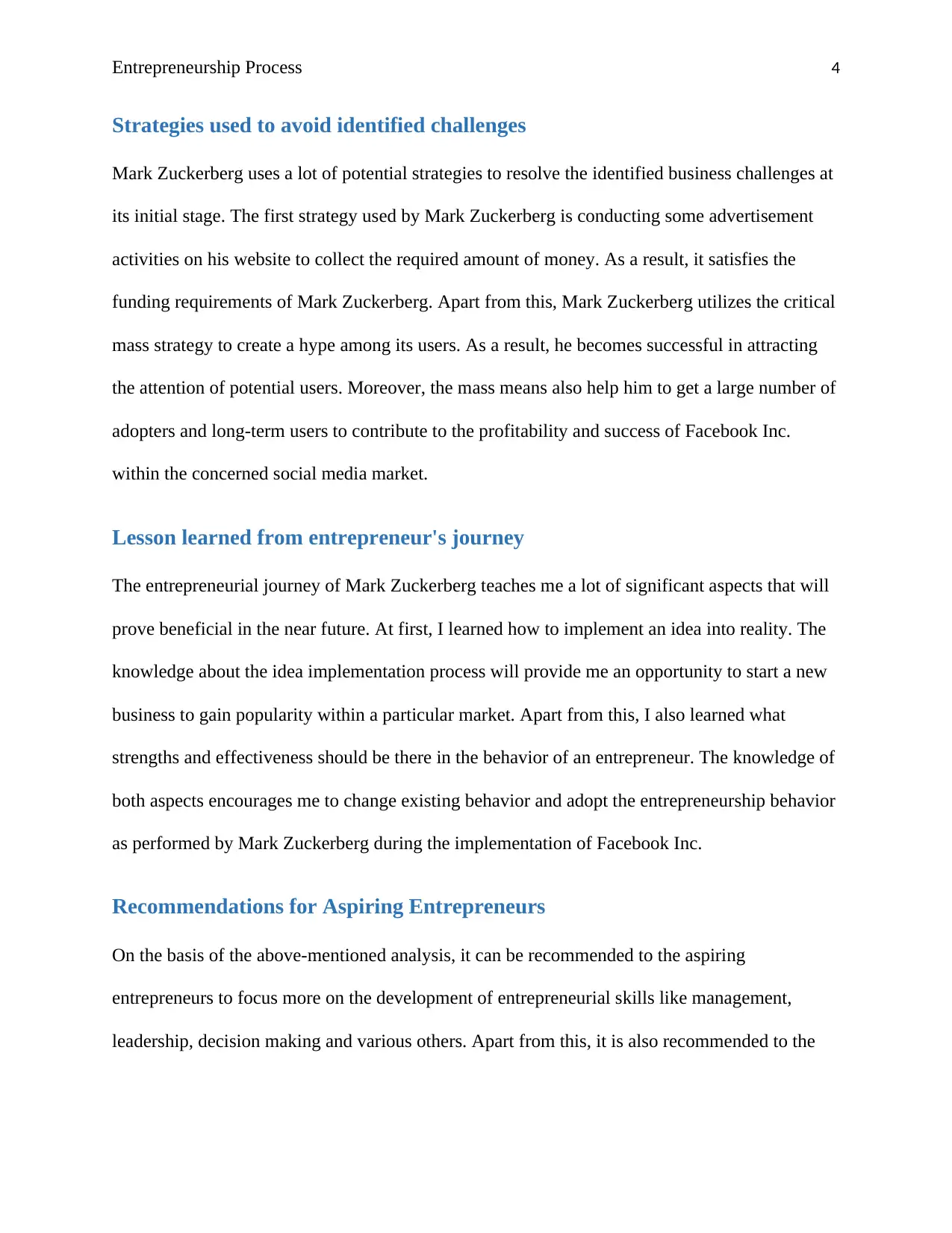
Entrepreneurship Process 4
Strategies used to avoid identified challenges
Mark Zuckerberg uses a lot of potential strategies to resolve the identified business challenges at
its initial stage. The first strategy used by Mark Zuckerberg is conducting some advertisement
activities on his website to collect the required amount of money. As a result, it satisfies the
funding requirements of Mark Zuckerberg. Apart from this, Mark Zuckerberg utilizes the critical
mass strategy to create a hype among its users. As a result, he becomes successful in attracting
the attention of potential users. Moreover, the mass means also help him to get a large number of
adopters and long-term users to contribute to the profitability and success of Facebook Inc.
within the concerned social media market.
Lesson learned from entrepreneur's journey
The entrepreneurial journey of Mark Zuckerberg teaches me a lot of significant aspects that will
prove beneficial in the near future. At first, I learned how to implement an idea into reality. The
knowledge about the idea implementation process will provide me an opportunity to start a new
business to gain popularity within a particular market. Apart from this, I also learned what
strengths and effectiveness should be there in the behavior of an entrepreneur. The knowledge of
both aspects encourages me to change existing behavior and adopt the entrepreneurship behavior
as performed by Mark Zuckerberg during the implementation of Facebook Inc.
Recommendations for Aspiring Entrepreneurs
On the basis of the above-mentioned analysis, it can be recommended to the aspiring
entrepreneurs to focus more on the development of entrepreneurial skills like management,
leadership, decision making and various others. Apart from this, it is also recommended to the
Strategies used to avoid identified challenges
Mark Zuckerberg uses a lot of potential strategies to resolve the identified business challenges at
its initial stage. The first strategy used by Mark Zuckerberg is conducting some advertisement
activities on his website to collect the required amount of money. As a result, it satisfies the
funding requirements of Mark Zuckerberg. Apart from this, Mark Zuckerberg utilizes the critical
mass strategy to create a hype among its users. As a result, he becomes successful in attracting
the attention of potential users. Moreover, the mass means also help him to get a large number of
adopters and long-term users to contribute to the profitability and success of Facebook Inc.
within the concerned social media market.
Lesson learned from entrepreneur's journey
The entrepreneurial journey of Mark Zuckerberg teaches me a lot of significant aspects that will
prove beneficial in the near future. At first, I learned how to implement an idea into reality. The
knowledge about the idea implementation process will provide me an opportunity to start a new
business to gain popularity within a particular market. Apart from this, I also learned what
strengths and effectiveness should be there in the behavior of an entrepreneur. The knowledge of
both aspects encourages me to change existing behavior and adopt the entrepreneurship behavior
as performed by Mark Zuckerberg during the implementation of Facebook Inc.
Recommendations for Aspiring Entrepreneurs
On the basis of the above-mentioned analysis, it can be recommended to the aspiring
entrepreneurs to focus more on the development of entrepreneurial skills like management,
leadership, decision making and various others. Apart from this, it is also recommended to the
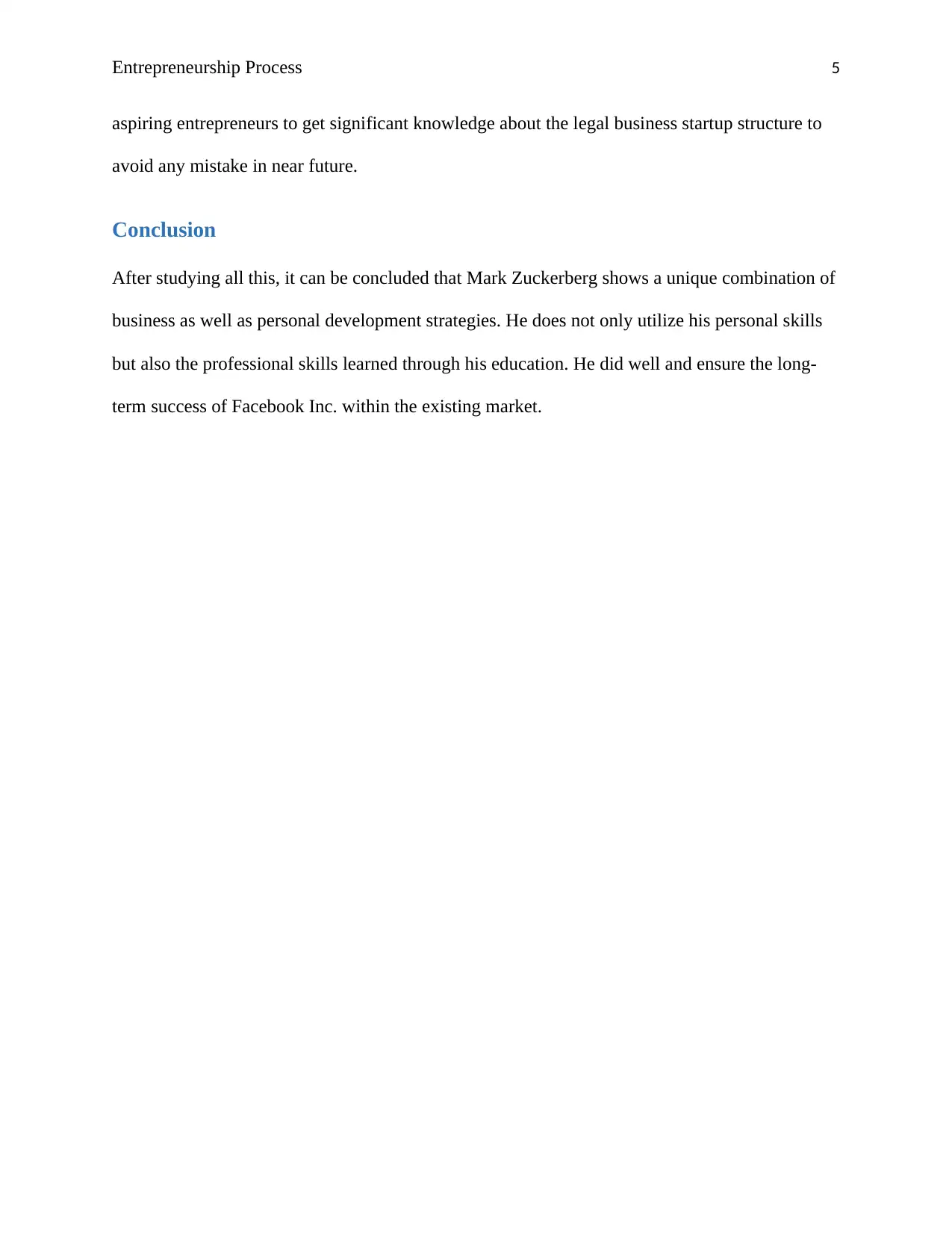
Entrepreneurship Process 5
aspiring entrepreneurs to get significant knowledge about the legal business startup structure to
avoid any mistake in near future.
Conclusion
After studying all this, it can be concluded that Mark Zuckerberg shows a unique combination of
business as well as personal development strategies. He does not only utilize his personal skills
but also the professional skills learned through his education. He did well and ensure the long-
term success of Facebook Inc. within the existing market.
aspiring entrepreneurs to get significant knowledge about the legal business startup structure to
avoid any mistake in near future.
Conclusion
After studying all this, it can be concluded that Mark Zuckerberg shows a unique combination of
business as well as personal development strategies. He does not only utilize his personal skills
but also the professional skills learned through his education. He did well and ensure the long-
term success of Facebook Inc. within the existing market.
⊘ This is a preview!⊘
Do you want full access?
Subscribe today to unlock all pages.

Trusted by 1+ million students worldwide
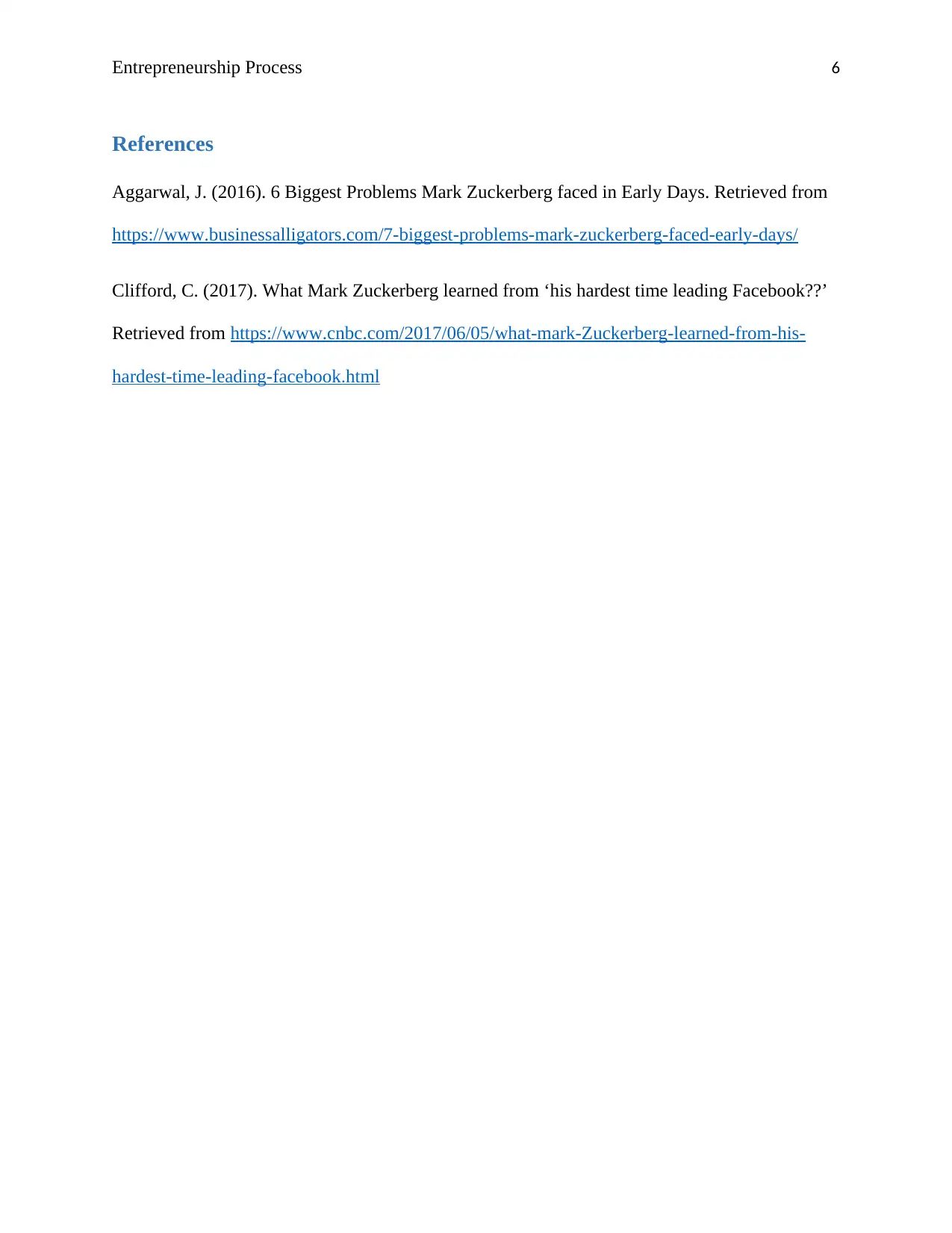
Entrepreneurship Process 6
References
Aggarwal, J. (2016). 6 Biggest Problems Mark Zuckerberg faced in Early Days. Retrieved from
https://www.businessalligators.com/7-biggest-problems-mark-zuckerberg-faced-early-days/
Clifford, C. (2017). What Mark Zuckerberg learned from ‘his hardest time leading Facebook??’
Retrieved from https://www.cnbc.com/2017/06/05/what-mark-Zuckerberg-learned-from-his-
hardest-time-leading-facebook.html
References
Aggarwal, J. (2016). 6 Biggest Problems Mark Zuckerberg faced in Early Days. Retrieved from
https://www.businessalligators.com/7-biggest-problems-mark-zuckerberg-faced-early-days/
Clifford, C. (2017). What Mark Zuckerberg learned from ‘his hardest time leading Facebook??’
Retrieved from https://www.cnbc.com/2017/06/05/what-mark-Zuckerberg-learned-from-his-
hardest-time-leading-facebook.html
1 out of 7
Related Documents
Your All-in-One AI-Powered Toolkit for Academic Success.
+13062052269
info@desklib.com
Available 24*7 on WhatsApp / Email
![[object Object]](/_next/static/media/star-bottom.7253800d.svg)
Unlock your academic potential
Copyright © 2020–2026 A2Z Services. All Rights Reserved. Developed and managed by ZUCOL.





